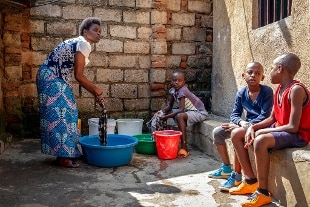Unicef: today monuments illuminated in blue for World Children's Day
Cop26, Unicef: risks for almost 2.2 billion children
Unicef, via crowdfunding campaign against Covid vaccine for all
Unicef: 77 million children still out of school due to the pandemic
Share
09 December 2021 Covid-19 is "the greatest global crisis for children in our 75 years of history".
This is the analysis of UNICEF, which in a report released today warns that the pandemic is reversing virtually every measure of progress for children, including a "staggering increase of 100 million more children plunged into poverty, about1 , 8 children every second from mid-March 2020 ".
"The path to regain lost ground - Unicef explains in a note - is long and, even in the best of cases, it will take seven to eight years to recover and return to pre-Covid levels of poverty for children". "Throughout our history, UNICEF has contributed to creating healthier and safer environments for children around the world, with great results for millions of people," said Director General Henrietta Fore. Now these results are now at risk. To respond, recover and reimagine the future of every child, UNICEF continues to call for investment in social protection, human capital and spending for an inclusive and resilient recovery - End the pandemic and reverse thealarming setback in children's health and nutrition - including leveraging UNICEF's vital role in delivering the COVID-19 vaccine; - Rebuilding more solidly by ensuring quality education, protection and good mental health for every child ; - Building resilience to better prevent, respond and protect children from crises - including new approaches to end famines, protect children from climate change and re-imagine spending on and disasters.better respond to and protect children from crises - including new approaches to end famines, protect children from climate change and re-imagine spending on and disasters.better respond to and protect children from crises - including new approaches to end famines, protect children from climate change and re-imagine spending on and disasters.

